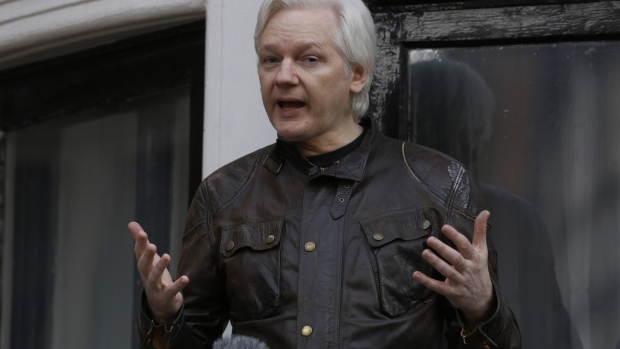Nov 16, 2018
Assange Has Been Charged, U.S. Prosecutors Reveal in Filing Goof
, Bloomberg News

(Bloomberg) -- WikiLeaks founder Julian Assange has been charged by federal prosecutors in Virginia in a move that suggests the U.S. government is determined to pursue his extradition, according to a filing in an unrelated court case.
It is unclear what Assange, who’s been living in the Ecuadorean Embassy in London since 2012, has been charged with. The indictment was revealed inadvertently in a filing in a case not connected to the 47-year-old.
Assistant U.S. Attorney Kellen S. Dwyer argued that the case "would need to remain sealed until Assange is arrested in connection with the charges in the criminal complaint and can therefore no longer evade or avoid arrest and extradition in this matter."
Assange has been under investigation ever since WikiLeaks published thousands of classified government documents, including diplomatic cables and military documents, starting in 2010. He’s also come under scrutiny by U.S. Special Counsel Robert Mueller amid probes into possible collusion between the Trump campaign and Russia. In 2016, WikiLeaks published emails from the Democratic National Committee that had been hacked by Russian intelligence.
"The prosecutor on the order is not from Mr. Mueller’s team and Wikileaks has never been contacted by anyone from his office," Wikileaks said in a comment posted on Twitter. Lawyers for Assange didn’t respond to requests for comment.
The charges were mistakenly disclosed in a a three-page filing dated Aug. 2 in a case against a man named Seitu Sulayman Kokayi, who is charged with coercing and enticing an underage person in sexual activity.
The filing error was revealed on Twitter by Seamus Hughes, an expert on terrorism at George Washington University, who is known for closely monitoring court cases.
Assange, who became an Ecuadorian citizen in December, has been fighting Ecuador’s Foreign Affairs Ministry which has imposed restrictions on him during his stay at the embassy, including rules barring him from commenting on politics and requiring him to clear any visitors three days in advance.
Assange sought refuge in the Ecuadorian Embassy in 2012 to avoid extradition to Sweden, where he faced allegations of rape, or the U.S. where he could face trial for publishing the thousands of secret government documents in 2010.
To contact the reporter on this story: Stephanie Baker in London at stebaker@bloomberg.net
To contact the editors responsible for this story: James Hertling at jhertling@bloomberg.net, Anthony Aarons, Christopher Elser
©2018 Bloomberg L.P.







